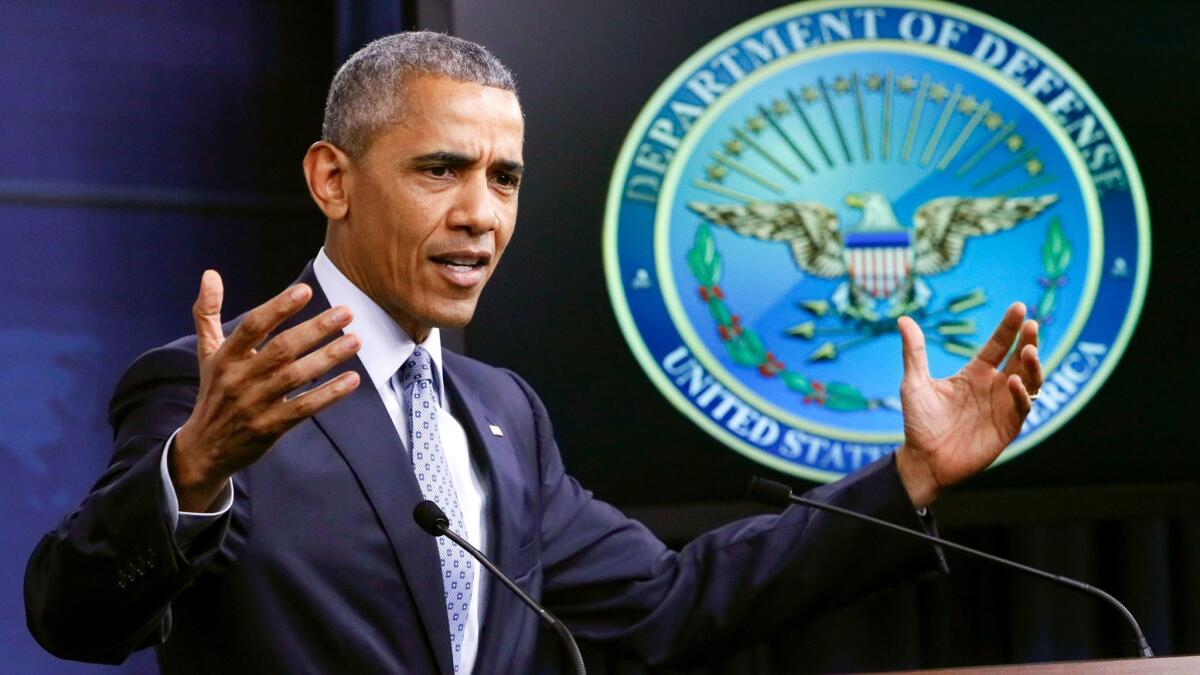Op-Ed: I’m a former CIA officer and a Democrat. Here’s what Obama still doesn’t get about terrorism

President Obama on Tuesday delivered his final defense of the nation’s counter-terrorism strategy. He rightfully claimed progress on a number of fronts, including the death of Osama bin Laden, an end to waterboarding and the effective use of drones to kill terrorists. Just one week after the Islamic State-inspired attack in Columbus, Ohio, he also reiterated that there is no “war between the United States and Islam.” Islamic State and Al Qaeda, he said, do not speak for Muslims everywhere.
To me and many of my former colleagues at the Central Intelligence Agency, such pronouncements reflect Obama’s greatest blind spot in his fight against terrorism: he has been unwilling to acknowledge that Islamic ideology plays a role in what motivates terrorists to strike. Meanwhile, men like Imam Bujar Hysa, a jailed cleric in Albania, frame the war on terrorism quite succinctly: “Islam can coexist with other religions, but with democracy? No!”
Hysa isn’t an anomaly. He is a Salafist Muslim — a sect also called Wahhabi — who follows an ultraconservative set of beliefs propagated by Saudi Arabia and other Sunni Arab nations. Wahhabis do not believe in a separation of church (mosque) and state. For them, government should be made up of religious clerics — and only clerics — that use the Koran to justify their decisions.
Are we at war with the whole of Islam, or should we be? Of course not. But Islam is a faith in crisis.
President-elect Donald Trump’s chosen national security advisor, Lt. Gen. Michael Flynn, has tried explaining this — albeit in impolite terms — by saying that “Islam is a political ideology based on a religion.”
Flynn’s poorly worded warning stems from experience, and he knows what happens when religious leaders take over governments. Women face widespread discrimination. Gay people are imprisoned or killed. Dancing, music and other forms of art are banned. And those who criticize Islam or convert to Christianity face prison or death.
However, what causes the most alarm to national security experts is the Wahhabi objective of global conquest. Islamic State and Al Qaeda are terrorist groups built on Wahhabi ideology. They want to govern the world under sharia law, and they are more than willing to achieve their goals through force. Islamic State is known for beheading its victims or burning them alive. And as we saw in Columbus, they’re inspiring legions of supporters.
Which brings us back to Imam Hysa and his home nation Albania. The tiny Balkan country has a majority-Muslim population that — until recently — had a tradition of moderate, tolerant Islam. But the country is in the midst of Wahhabi radicalization, spread by Saudi Arabia and other Persian Gulf donors. The result? More than 100 citizens of Albania are now confirmed to have fought for Islamic State. That’s roughly the same number as those sent from much larger nations such as Italy and Spain.
Albania is not alone. The easiest targets for Wahhabis are smaller countries and places where poverty and corruption run deep. Consider the struggling nation of Kosovo. Radical clerics and secretive associations have turned a once-tolerant Muslim society into a font of extremism.
In Afghanistan too, Saudi Arabia and its virulent strain of Islam are wrecking havoc.
Terrorism experts understand that larger, more stable nations are under threat as well. In Germany, the government recently launched a massive raid on the Wahhabi missionary group “The True Religion” because of its ties to Islamic State. This crackdown followed a wave of attacks on the German people last summer. In the words of Berlin’s Interior Minister, Islamic terrorism is Germany’s greatest domestic security threat. In a controversial step just days ago, German Chancellor Angela Merkel added her vocal opposition to the full-faced veil — a Salafist requirement for female worshipers.
The United States has also suffered the consequences of Islamist extremism and those inspired by the radical ideology. We remember San Bernardino. Boston. Ft. Hood. Little Rock. Garland. Chattanooga. Ft. Dix. Orlando. Shanksville. New York. Washington.
Muslims have every right to sit at the American table if they support the Constitution. We should all proudly acknowledge brave women and men like my former CIA colleague who led our nation’s war on terrorism for more than 15 years; he’s Shiite Muslim. This officer — whom I can’t name because he’s still officially under cover— was ruthless in his hunt for radical killers, and he deserves a medal for his years of sacrifice.
Are we at war with the whole of Islam, or should we be? Of course not. But Islam is a faith in crisis, and to deny that certain strains of the religion are contributing to global instability is to deny reality.
After eight years as president, Obama still doesn’t understand that.
With luck and wisdom, President Trump will fare better. My hope is that he and others in his administration will go out of their way to embrace loyal Muslim Americans, even as they publicly acknowledge that this proud faith is struggling to shed itself of a cancerous evil.
Bryan Dean Wright is a former CIA ops officer and member of the Democratic Party. Follow him on Twitter @BryanDeanWright.
Follow the Opinion section on Twitter @latimesopinion and Facebook
MORE FROM OPINION
Sharing biblical stories and 100 years of life lessons with Kirk Douglas
The story behind Trump’s tweet attack on Chuck Jones of the United Steelworkers
Wells Fargo’s actions should persuade lawmakers to rein in forced arbitration
More to Read
A cure for the common opinion
Get thought-provoking perspectives with our weekly newsletter.
You may occasionally receive promotional content from the Los Angeles Times.






